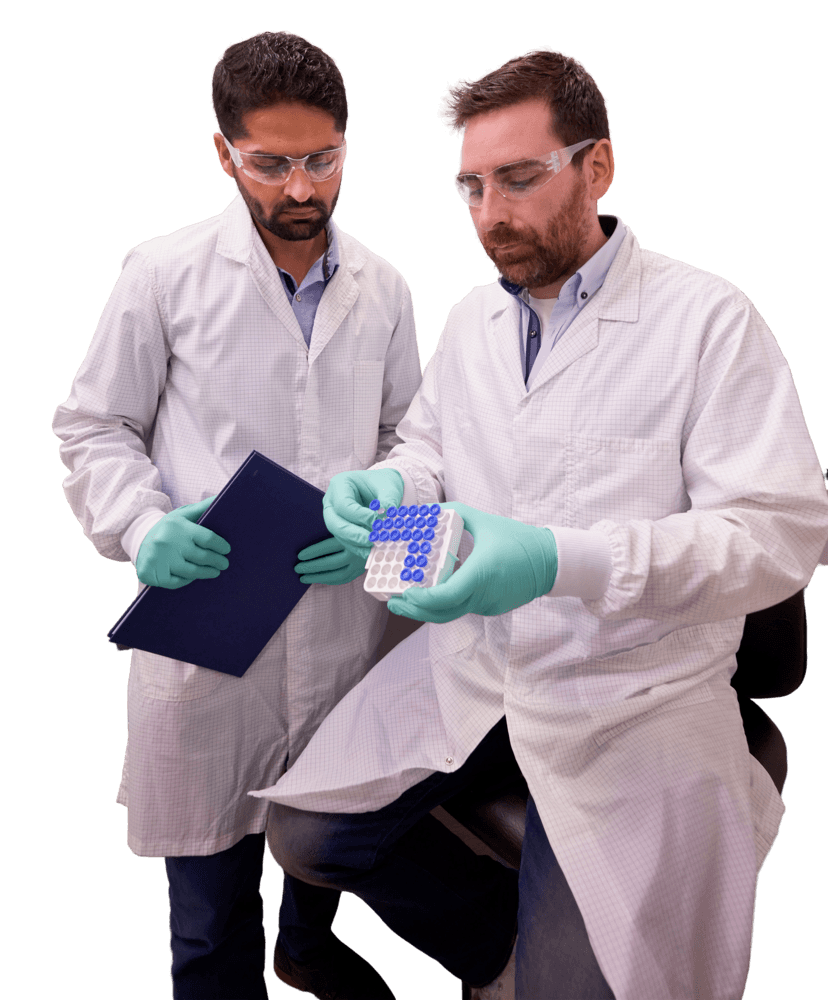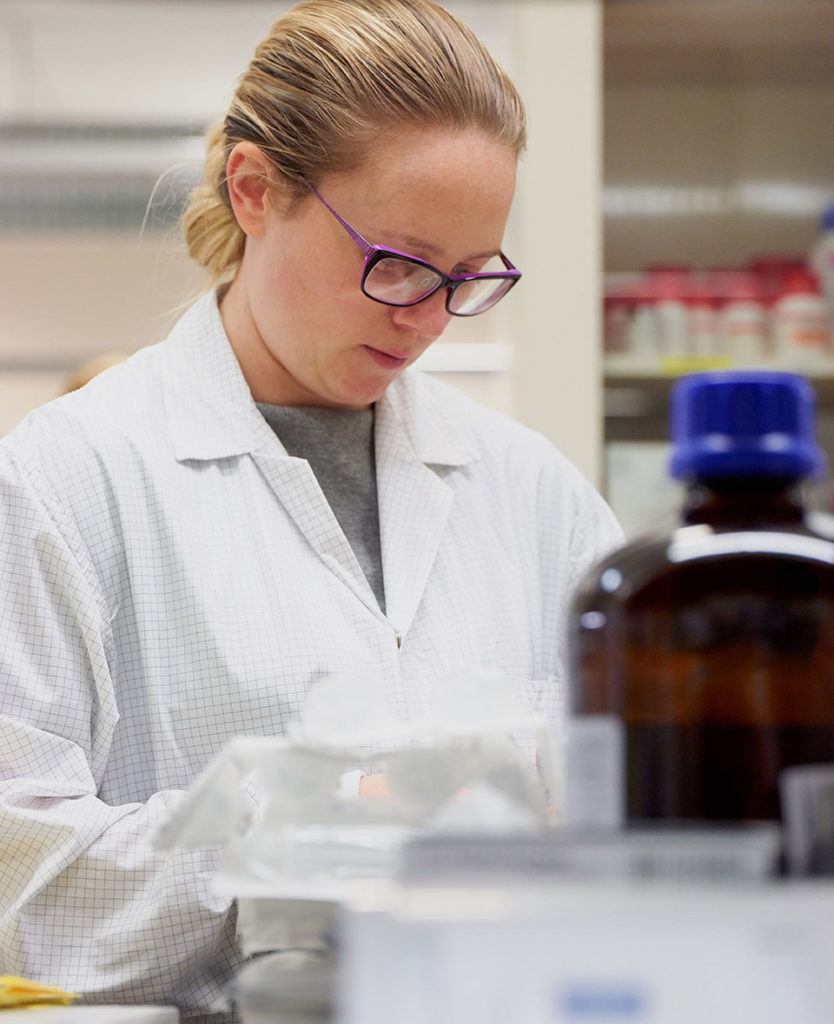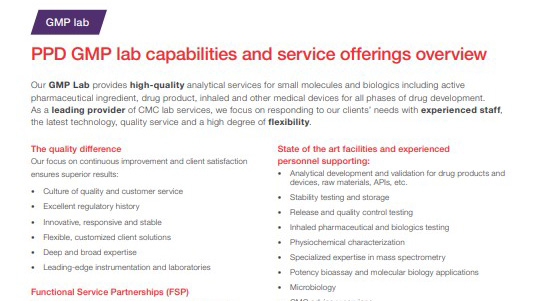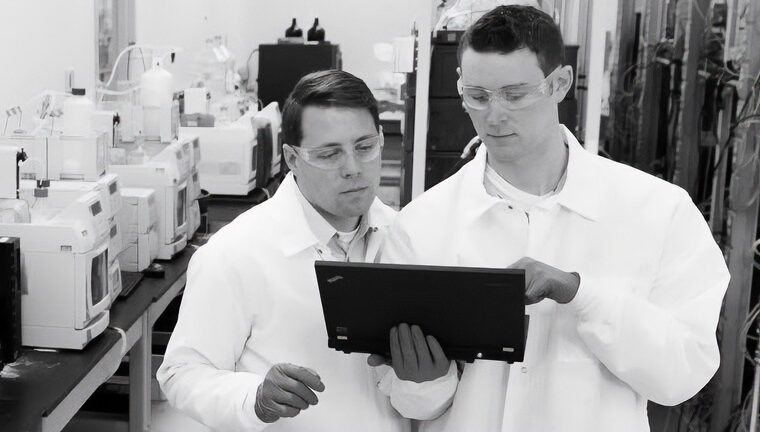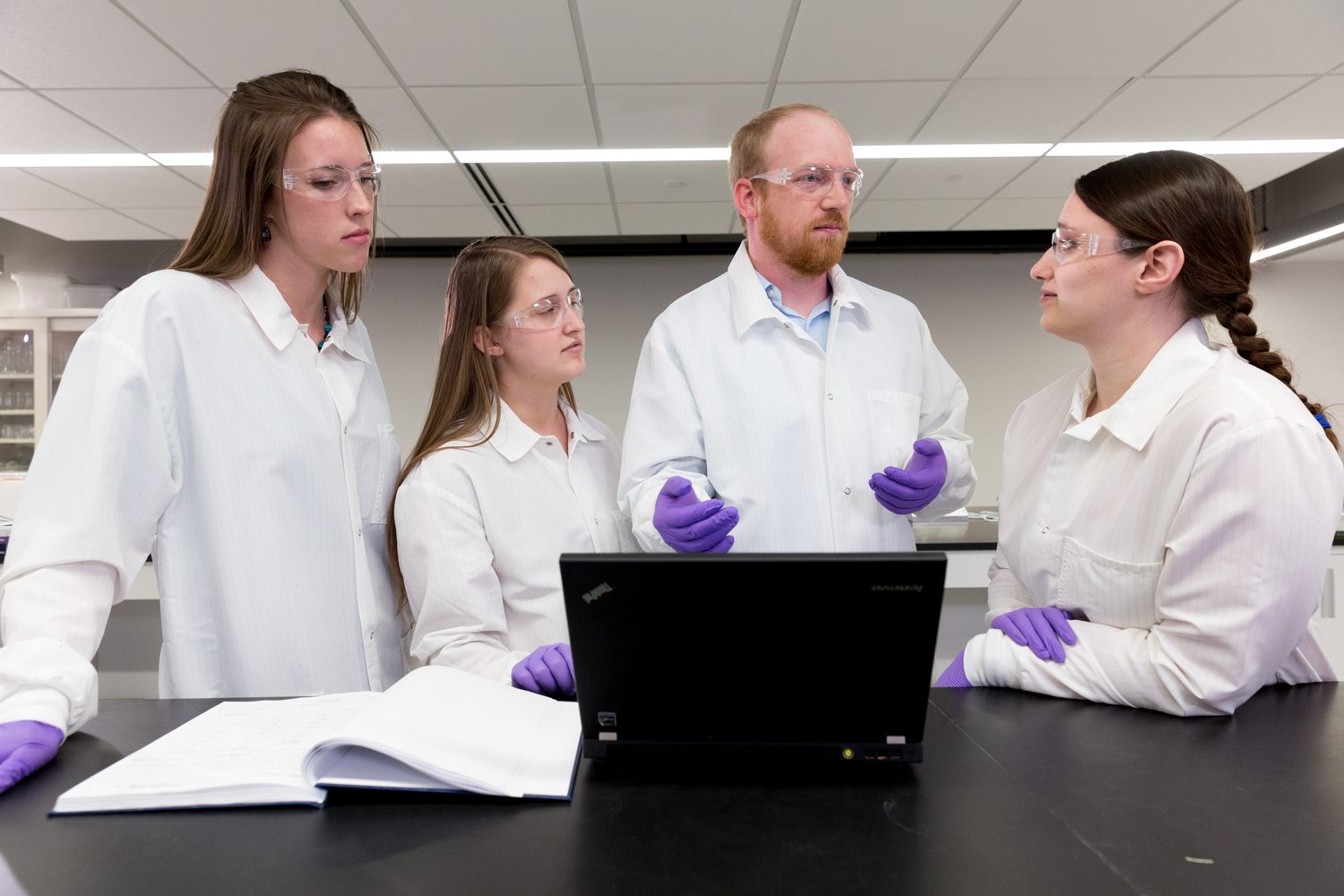
GMP Lab Capabilities
Biosafety capabilities and expertise
Advanced mycoplasma and viral testing services to support development of biologics and cell and gene therapies.
We have expanded testing capabilities offering compendial and novel validated biosafety methods. With extensive expertise in good manufacturing practice (GMP) regulations and polymerase chain reaction (PCR) technologies, our biosafety lab offers fast, simple, and reliable options for characterization of cell banks, and for unprocessed bulk and final products.
USP/EP/JP/PTC compliant mycoplasma assays
- Culture method
- Indicator cell culture method
- Mycoplasmastasis assay
- MycoSEQ Plus real-time PCR assay
- Enrichment MycoSEQ Plus real-time PCR assay
Viral safety testing
- In vitro adventitious viruses assays
- ViralSEQ real-time PCR assay for minute virus of mice
- Replication-competent assay for adeno-associated virus
- Replication-competent assay for lentiviruses
Product type experience
- Analytical/master/working cell banks
- Cell and gene therapy
- Monoclonal antibodies
- Media
Well-designed environmental control systems
- 2,000 sq ft of HEPA filtered, restricted access lab space with dedicated areas for:
- Mycoplasma testing
- Viral testing
- Pre- / Post-amplification PCR
- REES Scientific automated temperature monitoring system
Key instrumentation:
- Nikon® microscope models Upright Eclipse Ci and Inverted Ts2-FL
- Eppendorf/BioRad PCR thermal cyclers
- Kingfisher Automated Nucleic Acid Extraction System
- Applied Biosystems™ 7500 Real-Time qPCR
- Implen NanoPhotometer® NP80 Spectrometer
- NucleoCounter® NC-202
Cell-based assays
Cell-based assays, or bioassays, are designed to measure the potency and stability of a drug substance or product and are important in establishing safety and efficacy profiles for biopharmaceuticals.
PPD™ Laboratory services GMP lab has a 6,400-square-foot suite that is purpose-built and dedicated to bioassay development and testing. We work with customers to develop, transfer, optimize, qualify and validate potency assays that meet international regulatory and USP guidelines, in support of drug substance and drug product lot release and stability testing. Our lab can also create and maintain analytical cell banks for use in bioassay testing.
Our cell-based assay lab operations are led by doctorate-level cell biologists, averaging 30 years of experience developing and validating biological and immunological assays to support the development and commercialization of a range of biotherapeutic products and vaccines.
Our capabilities include:
- Cell bank creation/qualification
- Qualification of critical reagents
- Method development/validation
- GMP release and stability testing of drug substance and drug product
- Statistical analysis (JMP, PLA)
Our methods include:
- Cell proliferation and cytotoxicity
- Cytokine and metabolite effector phosphorylation
- Enzyme function assays
- Reporter gene assays
- Transfection/infection efficiency
- Binding
- Protein expression
Key instrumentation:
- Molecular Devices instrumentation: SpectraMax® M3, M5, M5e, Flexstation and I3 plate readers
- Perkin Elmer® EnVision® XCite multi-mode plate reader
- Biotek® Cytation 5 Cell Imaging Multi-Mode Reader
- FACSCanto™ II dual laser with 3 laser lines (405, 488, 633)
- Beckman Cytoflex with 3 laser lines (488, 638, 405)
- MSD® SECTOR® 600
- Digital microscopes
- Applied Biosystems™ qPCR
- ThermoFisher Scientific QuantStudio™ 7 Flex Real-Time qPCR
- Bio-Rad QX200 Droplet Digital PCR
- Proteinsimple Wes™ Western blotting
- Vi-CELL® Counter
- Tecan® FreedomEVO® 150 liquid handler
- JMP®, StatLIA®, PLA (Stegmann) software
Extractables and leachables
The dedicated and highly specialized extractables and leachables (E&L) team in our GMP lab has more than 15 years of experience providing wide-ranging support for E&L studies, including overall study design/consulting, container/closure selection and manufacturing process qualification and validation. Our E&L team and toxicology experts work with you to make informed decisions on which extractable compounds will be monitored as leachables in long-term stability studies, development of extractable and leachable methods, leachable stability testing, batch extractables testing and USP compendia testing support.
Our lab employees belong to various industry groups, participate in E&L conferences and are regular contributors to industry publications on E&L. Our extensive experience designing and conducting E&L studies across a range of container/closure and device materials and across nearly all routes of administration has positioned PPD Laboratory services as a leading industry expert in this highly technical field.
We can deliver an integrated toxicity/safety evaluation by experienced and American Board of Toxicology-certified toxicologists familiar with the application of Product Quality Research Institute (PQRI) and other industry recommendations.
Material evaluation expertise:
- A wide variety of parenteral product components including devices and containers/closures
- Inhalation devices for delivery to lung and nasal mucosa:
- Dry powder inhalers (DPI)
- Pressurized metered-dose inhalers (pMDI)
- Nasal spray solution/suspension bottles and pumps
- Materials types, product dosage forms and routes of administration:
- Transdermal products
- Oral products
- Labeling
- Adhesives
- Medical devices including implantables
- Primary and secondary packaging and manufacturing components
- Special case compounds:
- N-nitrosamines
- Mercaptobenzothiazole (MBT)
- Polyaromatic hydrocarbons (PAH)
- Other genotoxic impurities
Our services:
- Controlled extraction study (CES) for material profiling
- Leachable studies
- Unknown leachable identification
- Extractable profile and toxicological assessment
- Silicone oil testing
Key instrumentation:
- Liquid chromatography/mass spectrometry (LC/MS):
- AB SCIEX TripleTOF™ 5600
- Agilent 6545 QTOF
- Other vendor platforms and models of single- and triple-quad LC/MS systems
- Gas chromatography/mass spectrometry (GC/MS):
- Multiple single-quad GC/MS systems with headspace, direct injection and prep station capability
- Agilent 7890B / 5977 A/B MSD and other models Inductively coupled plasma mass spectrometry
- Inductively coupled plasma mass spectrometry (ICP-MS):
- Multiple inductively coupled plasma-optical emission spectrometry (ICP-OES) and mass spectrometry (MS) systems of various models and vendor platforms
- Dedicated lab areas for material extraction, preparation and analysis
- Stable Micro Systems texture analyzer model TA.XTplusC
Mass spectrometry and structural elucidation
The mass spectrometry (MS) team in the GMP lab works closely with our method development and stability areas to identify critical degradation products that emerge over the course of the development cycle.
We use advanced instrumentation to identify and characterize active components as well as process impurities during the early phases of development for small and large molecules.
To enable the analysis of compounds not compatible with traditional LC-MS, we have developed two-dimensional liquid chromatography mass spectrometry (2D-LC/MS) methodologies for online separation and detection of compounds.
Our service offering includes:
- LC-MS method development and validation of small molecules and large biomolecules, e.g. oligonucleotides, proteins, and monoclonal antibodies
- Characterization of active pharmaceutical ingredients (APIs), products, reference standards and other pharmaceutical ingredients
- Quantitative analysis of APIs, drug products, impurities using LC-UV/MS (single quadrupole or triple quadrupole mass spectrometers)
- Impurity and degradation product identification and structural elucidation using high resolution mass spectrometry
- Accurate mass determination for small molecules
- Molecular weight determination for large biomolecules
- High resolution mass spectrometry since we can use both Orbitrap and ToF MS
- Sequence confirmation for oligonucleotides
Key instrumentation:
- Thermo Scientific™ Q Exactive™ Plus with BioPharma Option mass spectrometer coupled with Vanquish UHPLC
- Obtrap Exploris™ 240 with BioPharma Option mass spectrometer coupled with Vanquish UHPLC
- Waters BioAccord LC-MS system
- Waters QDa detector coupled with ultra-high performance liquid chromatography (ACQUITY UPLC H-class Bio System)
- Waters ACQUITY® TQ Detector LC-MS/MS coupled with UPLC
- AB Sciex 5600+ Triple TOF (MS) coupled with 2D-UHPLC
- Applied Biosystems/MDS Sciex QTRAP® LC-MS/MS
- Applied Biosystems/MDS Sciex API LC-MS/MS
- Agilent single Quadrupole LC-MS
Microbiology
PPD Laboratory services’ GMP lab provides a wide range of microbiological testing. All tests are performed under GMP requirements and comply with applicable compendia (USP/EP/JP) requirements. We also accommodate specialty testing and projects of various sizes to suit a particular need. Our facility includes a 5,000-square-foot HEPA-filtered, restricted-access microbiology lab with a separate ISO Class 8 sterility suite.
Key instrumentation:
- Seven ISO class 5 biosafety cabinets
- A variety of incubators with 24/7 monitoring
- Walker Barrier Systems Half-suit Isolator
- Two Bioquell Qube sterility testing isolators
- PTI VeriPac 445 Micro Leak Detection System
- LIGHTHOUSE FMS-Oxygen Headspace Analyzer
- Two ProtoCOL SR zone readers
- Charles River EndoScan-V™
Our service offering includes:
Compendial USP/EP/JP microbiology testing
- Sterility Testing
- Microbial Limits
- Bioburden
- Antimicrobial Efficacy Testing
- Bacterial Endotoxin Testing
- Kinetic Chromogenic
- Kinetic Turbidimetric
- Gel Clot
- Water Activity
- Dye Ingress – Qualitative probabilistic
- Laser based Oxygen Headspace Analysis – Quantitative Deterministic
- Vacuum Decay – Quantitative Deterministic
Water testing
- Total Plate Count
- Total Organic Carbon
- Conductivity
- pH
Specialized microbiology studies
- Intravenous (IV) Microbial Challenge Hold Time Studies
- Bacteriophage Plaque Assay
- Low Endotoxin Recovery (LER) Studies
- Antibiotic Potency Assay
- Disinfectant Efficacy Studies
Product type experience
- Sterile injectable products
- Inhaled pharmaceuticals
- Oral and topical pharmaceuticals
- Over-the-counter (OTC) and consumer products
- Raw materials and active pharmaceutical ingredients (APIs)
Physical chemistry and material characterization
PPD Laboratory services’ GMP lab provides a complete selection of physical and chemical characterization technologies to support customers’ drug development programs. Our services support active pharmaceutical ingredient (API) analytical profiling, drug product preformulation and formulation development programs.
Our experts can develop methods and help customers design a comprehensive program that will proactively address full characterization of a variety of materials. In addition, these services can be combined with other analytical techniques to help you solve problems observed in the later phases of the drug development process.
Our service offering includes:
- X-ray powder diffraction (XRPD) for form identification, quantitative analysis, and crystallinity/amorphous determination; both reflection and transmission mode capable; VT/RH analysis available
- Melting point, enthalpy, polymorph and phase transition determination by differential scanning calorimetry thermal analysis (DSC), thermal gravimetric analysis (TGA)
- Particle-size analysis (laser diffraction and dynamic light scatter)
- Specific surface area by gas
- Microscopy services, including Raman-microscopy for particulate identification.
- Particulate enumeration using the Beckman HIAC liquid particle counter or the ProteinSimple MFI™ system
- Solution properties – solubility, zeta potential, viscosity, density, etc.
- Water content, water activity, and hygroscopicity
- Other assays including refractive index, total organic carbon, and FTIR
Key instrumentation:
- Industry standard equipment available for all testing per USP and EP recommendations and regulatory requirements
Protein characterization
Proper characterization ensures the identity, purity, structural and conformational integrity, and bioactivity of biologics. We provide global pharmaceutical and biologic product characterization services. With experience in protein, peptide, biologic and biosimilar product analysis, our expertise combines cutting-edge techniques and technology, including a range of high performance mass spectrometers with our industry leading knowledge.
- We provide a well characterized biologics package for IND/BLA filings in a cost effective and timely manner.
- Our biophysical characterization team combined with the large molecule mass spectrometry group supports a wide range of characterization activities
- We have a purpose-built LCMS and protein characterization BSL-2 lab
Key instrumentation:
- Orbitrap™ mass spectrometers
- Thermo Scientific™ Q Exactive™ Plus with “Biopharm Option”
- Orbitrap Exploris™ 240 Mass Spectrometer
- Orbitrap Exploris MX Mass Detector
- MS- BioAccord LC-MS with Time of Flight (ToF)
- Optima AUC
- J-1500 Circular Dichroism Spectrophotometer
- Nano DSC
- Zetasizer Nano Range
- INVENIO-S FTIR spectrometer with CONFOCHECK system for proteins analysis (LN-MCT detector with Bio-ATR II and AquaSpec cells)
- Cary Eclipse Fluorescence Spectrometer
- DAWN® and Optilab® used with 1260 HPLC system
- Biacore™ T200 and Biacore 1K+system
Biologics characterization capability examples:
Primary Structure:
- Intact mass (R and NR)
- ID (peptide mapping)
- Free thiol
- N- and C- terminal modifications
Higher Order Structure:
- Disulfide bonds
- CD (near and far UV)
- DSC
- Intrinsic Fluorescence
- FTIR
- Tm by UV
Functional Testing:
- SPR (Fc receptor family binding)
Impurity Characterization:
- SEC-MALS
- Charge variants (IEX-MS)
- AUC
- Oxidation/ Deamidation/ Isomerization
Post-translational Modification:
- N- and O-linked glycan analysis
- Glycosylation occupancy
- Glycopeptide profiling
Raw materials testing
PPD Laboratory services’ GMP lab provides a comprehensive suite of compendial and raw material testing in order to support all of our clients’ programs – from pre-clinical to commercial. Our team has extensive experience in routine testing per the USP, EP, & JP, and has evaluated other compendia, including the ChP, to provide testing services to clients.
Key services
- Method development and validation or method transfer
- Compendial method verification
- Routine release testing
Our offerings include monograph testing and physical testing
- Particle size distribution
- X-ray powder diffraction
- Pharmaceutical packaging and closure testing from the various compendia.
We offer guaranteed testing turnaround times with expedited testing options available to meet client deadlines. Our experienced raw material testing team manages programs with dedicated technical and project managers for all client studies.
Compendial analysis: USP, EP, JP, and others
Wet chemistry testing
- Identification
- Impurities limit tests (e.g. lead, arsenic)
- Assay by titration (manual and potentiometric)
- Gravimetric analysis (e.g. residue on ignition, loss on drying)
Instrument-based testing
- FTIR, UV-Vis
- TOC
- Atomic Absorption Spectroscopy (flame, furnace, and hydride generation)
- Optical rotation
- Specific gravity / density
- Refractive index
- Chromatography (LC, GC, IC), including post column derivatization for compendial ninhydrin positive substance testing of amino acids
- Water testing
- Karl Fisher, water activity, dynamic vapor sorption
- Osmolality
Performance characteristic testing
- Specific surface area
- Viscosity
Container, closure and packaging testing
- Glass containers (USP <660>, EP 3.2.1, JP 7.01)
- Plastic containers (USP <661>, EP 3.2.2, JP 7.02)
- Early adoption of USP <661.2> and <661.2>
- Elastomeric closures (USP <381>, EP 3.2.2, JP 7.03)
Stability
We provide a full complement of GMP analytical testing resources and expertise to support development as well as commercial stability studies for APIs and drug products in virtually all dosage forms and delivery systems. Whether your program requires stability studies that follow the guidelines of the International Council for Harmonisation of Technical Requirements for Pharmaceuticals for Human Use (ICH) or you need a customized program, our experts can help. We’ll work closely with you to design a program that meets your requirements.
Our service offering includes:
- ICH and customized testing for stability programs for APIs and finished product for small molecules and biologics in any dosage form/device/delivery system
- Drug Enforcement Agency (DEA)-compliant stability programs
- Photostability studies
- Temperature cycling, freeze-thaw and shipping studies
- Excipient and prototype formulation stability testing
- Evaluation of stability data using ICH Guideline Q1E
Key instrumentation and facilities:
- ICH- and DEA-compliant facilities
- More than 100,000 cubic feet of walk-in and reach-in stability storage space at two geographic locations with space for an additional 75,000 sq. ft. of storage chambers
- Customized electronic sample tracking tool monitored by computerized alarm system
- Chamber condition limit alarm with automatic telephone call-out to staff (24/7)
- Full generator backup
- Standard chamber conditions range from -80°C to 50°C with 15% to 75% relative humidity (RH)
- Customized temperature and relative humidity conditions can be accommodated upon request
- Photostability chamber with white (visible) and near UV (UV-A) exposure options
Reference material fill and distribution
PPD Laboratory services’ GMP lab has more than 25 years of experience in supply chain management and logistics, including material storage, dispensing, inventory management and distribution. We have performed storage, portioning and distribution services for more than 100 pharmaceutical customers with compounds at various storage conditions and compound type, including active pharmaceutical ingredients (APIs), raw materials, finished goods and materials, selective dangerous goods/hazardous materials and controlled substance classes I-V.
Our dedicated and highly trained team provides comprehensive services for aliquoting and repackaging diverse liquid and dry materials in the following environments: aseptic technique fills with sterile materials, N2, Biosafety Level 2 (BSL2), controlled substances within a dedicated laboratory space, and ISO class 5 biosafety cabinets with GMP quality control. We can accommodate all types of containers and sizes.
We store or ship your critical materials at a full range of temperatures, from ambient through cryogenic, in controlled, GMP environments with full audit trail and material traceability, minimizing time-out-of-environment. All storage units are validated, and temperatures are mapped and controlled with ongoing maintenance from our in-house metrology group. Our storage and distribution facilities have controlled access with 24/7 temperature monitoring.
Our services include:
Secure storage
- 150,000+ cubic feet of storage capacity
- Shared or client-dedicated storage options; dedicated units can be set for any storage condition
- Option to split material across storage units for risk mitigation
- Inventory monitoring with low quantity alert limits applied
Bulk material aliquoting
- Biosafety cabinet (BSC) hoods for aliquoting GMP fills of up to 50,000 vials per week
- Accommodate volumes as low as 10µl
- Package and label ambient and temperature sensitive materials up to -130 C on demand using unique IDs with electronic tracking. Inventory can be recorded in customer laboratory information management system (LIMS).
Global distribution
- All packaging conducted at temperature with zero time out of environment pack and ship capabilities; client-specified packaging and shipping containers supported
- Accommodate customs and import regulations across Europe, APAC and Latin America
- Communication with customs brokers and secure clearance of international shipments prior to shipment
Related resources
Learn more about PPD Laboratory services’ GMP lab capabilities.
Learn more about PPD Laboratory services GMP lab
To request a proposal or contact your local business development representative, please complete the form below.
